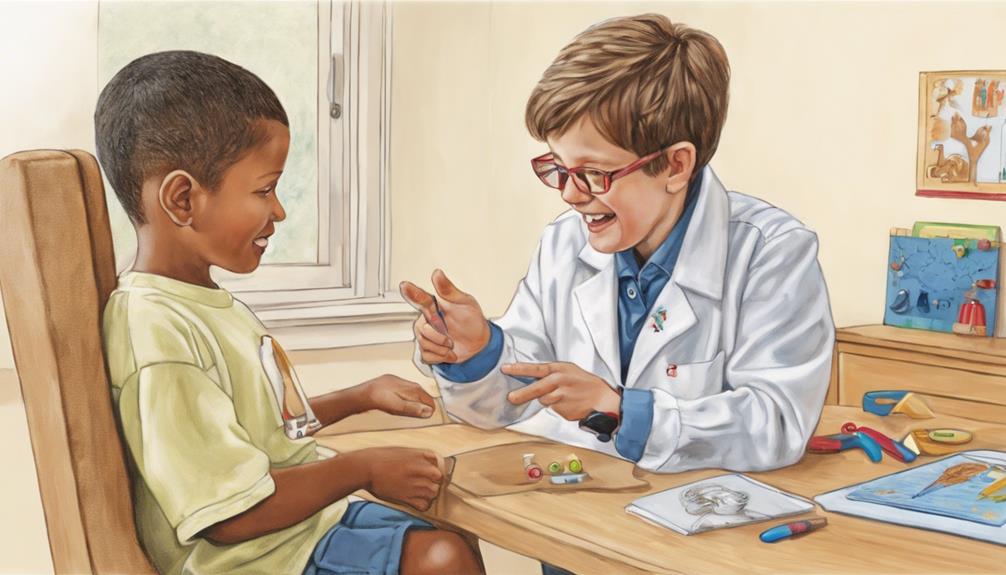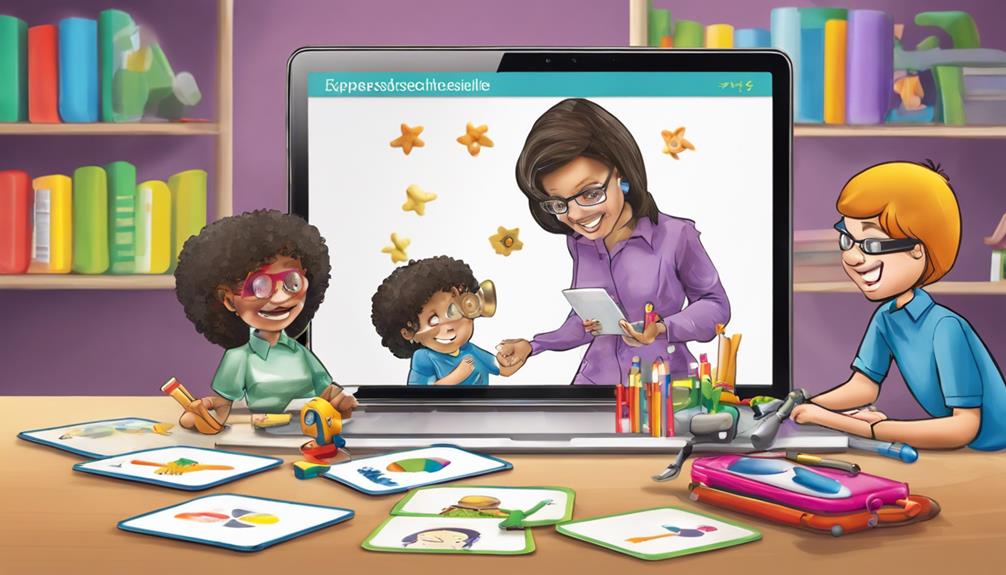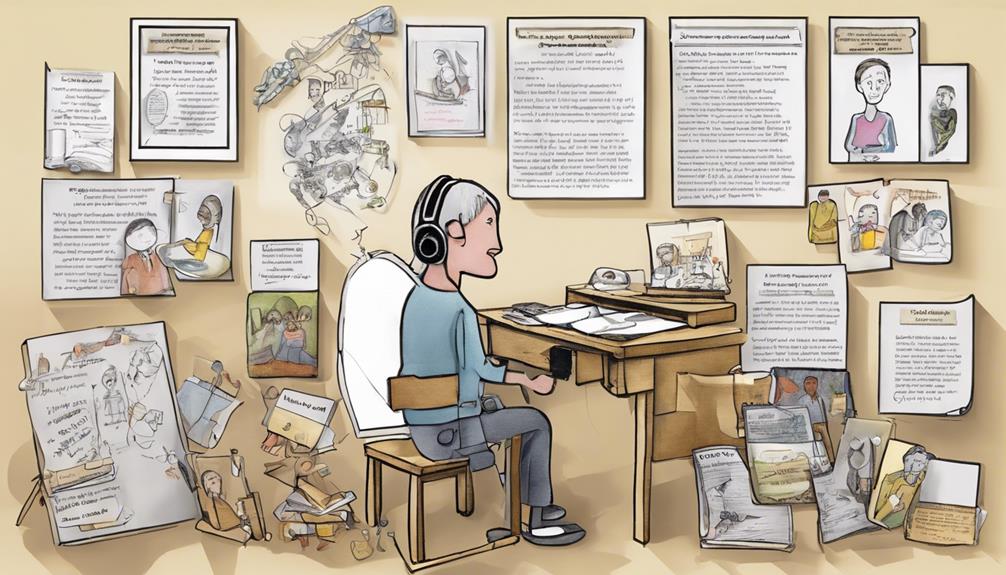When thinking about speech therapy activities for auditory processing, it is interesting to point out that around 5-7% of school-aged children show signs of auditory processing disorder.
Exploring various engaging exercises tailored to improve auditory processing can lead to significant advancements in speech and listening capabilities.
By implementing creative and interactive activities that stimulate the auditory senses, therapists can effectively enhance a child's ability to process and comprehend sounds.
Such exercises not only target specific auditory challenges but also foster overall language and cognitive development.
The impact of these activities reaches far beyond just auditory skills, making them a valuable asset in a comprehensive therapy plan.
Key Takeaways
- Enhance auditory discrimination and memory skills through engaging exercises.
- Improve listening abilities and auditory attention with dynamic challenges.
- Incorporate sound effects and music for an immersive storytelling experience.
- Strengthen auditory processing abilities with structured games and activities.
Fun Sound Discrimination Games
Engaging in fun sound discrimination games can significantly enhance children's auditory processing skills by helping them differentiate between similar sounds. These activities play a crucial role in improving auditory processing skills, especially for children with Auditory Processing Disorders. By participating in sound discrimination games, individuals can sharpen their ability to identify and interpret subtle differences in sounds, which is essential for speech therapy and language development. These games involve distinguishing between phonemes, tones, or environmental sounds, enabling children to refine their listening abilities and auditory attention.
Moreover, practicing sound discrimination can boost auditory focus and concentration in children facing auditory processing difficulties. Through these games, individuals become more proficient in recognizing and understanding various auditory cues, contributing to overall auditory processing skill enhancement. By incorporating sound discrimination activities into therapy sessions or educational settings, children can experience tangible improvements in their auditory processing abilities, leading to enhanced communication skills and academic performance.
Rhyming Words Activity Ideas

To further enhance auditory processing skills in children, exploring Rhyming Words Activity Ideas can be a beneficial and enjoyable way to promote phonological awareness and language development. Rhyming words activities are excellent tools for improving a child's auditory processing abilities.
By engaging in activities that involve matching rhyming words, children can enhance their auditory discrimination and memory skills. These games not only help in developing vocabulary but also aid in language processing. When children identify rhymes, they're actively working on sound recognition and sequencing, which are crucial for auditory processing.
The interactive nature of rhyming activities makes them fun for children while being incredibly beneficial for their overall auditory processing development. Encouraging children to participate in rhyming word games can have a lasting impact on their language skills and phonological awareness.
Incorporating such activities into therapy sessions or daily routines can make a significant difference in a child's auditory processing abilities.
Interactive Storytelling With Sounds
Interactive storytelling with sounds immerses participants in a multisensory experience, enhancing auditory processing skills through the incorporation of sound effects and music. By engaging in interactive storytelling sessions that include various sound effects and music, individuals can improve their auditory processing abilities. This approach not only stimulates sound discrimination, memory, and listening comprehension but also boosts engagement and retention through auditory stimulation. Through creative and interactive methods, storytelling becomes more immersive and effective in honing auditory processing skills.
| Auditory Processing | Interactive Storytelling | Sound Effects |
|---|---|---|
| Improvement of sound discrimination | Engages participants in a multisensory experience | Enhances the storytelling experience |
| Boosts memory retention | Utilizes creative methods for engagement | Adds depth and realism to the stories |
| Enhances listening comprehension | Encourages active participation | Creates a stimulating auditory environment |
Engaging Musical Chairs Variations

Adapting musical chairs variations for auditory processing therapy involves incorporating auditory cues such as clapping or instrument sounds during gameplay. By using different musical genres or styles, individuals can enhance their auditory discrimination skills while engaging in this classic game. Adjusting the speed or intensity of the music adds another layer of challenge, encouraging participants to sharpen their auditory processing abilities. Through this adaptation, players are prompted to actively listen and respond quickly to auditory stimuli, promoting improved processing of sounds and enhancing overall auditory skills.
Incorporating auditory cues into musical chairs not only makes the game more engaging but also provides a structured way to work on auditory discrimination. By utilizing the dynamic nature of music, individuals can practice distinguishing between different sounds and responding accordingly, fostering a more acute sense of auditory awareness. This variation offers a fun and interactive approach to therapy, combining the benefits of auditory processing exercises with the excitement of a familiar game.
Creative Auditory Memory Challenges
Exploring auditory memory challenges further, we can enhance our ability to recall specific details from audio stimuli, such as sequences of sounds, words, or musical notes. These challenges play a crucial role in improving working memory and focusing on auditory processing skills. By engaging in activities that involve repeating, rearranging, or identifying sounds in different contexts, individuals can strengthen their auditory processing abilities and listening skills.
For individuals with Auditory Processing Disorder (APD), creative auditory memory challenges offer a structured approach to honing their auditory processing skills. These activities provide a way to practice recognizing and interpreting auditory information effectively. By participating in these challenges, individuals can build resilience against the difficulties posed by APD and enhance their overall auditory processing capabilities.
Incorporating creative auditory memory challenges into therapy sessions or daily practice routines can lead to significant improvements in auditory processing and listening skills. These exercises offer a dynamic and engaging way to boost memory retention and auditory processing abilities, benefiting individuals seeking to enhance their auditory skills.
Frequently Asked Questions
What Are the Exercises for Auditory Processing?
We engage in various exercises for auditory processing, such as sound matching, Simon Says, listening walks, rhyming games, and sound bingo. These activities focus on auditory discrimination, memory, attention, sequencing, and vocabulary skills.
How Can Auditory Processing Be Improved?
Improving auditory processing involves engaging in activities that challenge sound discrimination and memory. These exercises aim to enhance listening skills through structured practice.
Key activities include sound matching, Simon Says, and rhyming games that target skills like auditory discrimination, memory, attention, sequencing, and vocabulary.
How to Treat Auditory Processing Disorder in Speech Therapy?
In speech therapy, we treat auditory processing disorder by utilizing exercises that target listening skills and speech comprehension. Our focus is on enhancing language development and communication abilities through individualized treatment plans.
Techniques like sound matching activities, rhyming games, and listening walks are effective in strengthening auditory processing skills. By tailoring our approach to each child's specific needs and challenges, we aim to improve their ability to process and interpret auditory information.
What Are the Tools to Help Auditory Processing Disorder?
We can help auditory processing disorder with tools like FM systems, assistive listening devices, visual aids, and sound amplification systems. These tools aid individuals with auditory processing difficulties, enhancing therapy and daily communication.
Technology advancements, such as auditory processing apps, offer innovative ways to practice and improve auditory processing skills. It's crucial to explore these tools to support individuals with auditory processing disorder effectively.
How can Engaging Speech Therapy Exercises Help Improve Auditory Processing?
Engaging speech therapy exercises are essential for enhancing auditory memory therapy. These exercises can help improve auditory processing by challenging the brain to listen, understand, and remember spoken information. By incorporating fun and interactive activities, speech therapy can strengthen auditory memory and promote better communication skills.
Conclusion
In the symphony of auditory processing speech therapy activities, we orchestrate a harmonious blend of sounds to help children tune into their unique abilities. Through these engaging exercises, we help children unlock the melodies of their potential, allowing them to navigate the cacophony of auditory challenges with confidence and skill.
Let the rhythm of progress guide us as we continue to fine-tune their listening and speech skills, creating a melody of success in their journey towards better communication.










